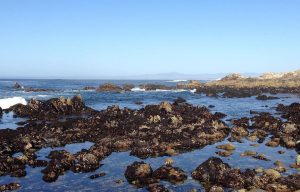New research unveils environment drivers of ecological complexity in marine intertidal communities
by Swansea University
9/2/2020
 In a paper published by Ecology, Swansea University’s Dr Miguel Lurgi paired up with researchers from the Coastal Marine Research station in Chile, who compiled data of species composition and three types of ecological interactions occurring between species in rocky intertidal communities across 970km of shoreline of the South American Pacific coast. They analysed the environmental drivers of the structure of networks of ecological interactions between species in marine intertidal communities.
In a paper published by Ecology, Swansea University’s Dr Miguel Lurgi paired up with researchers from the Coastal Marine Research station in Chile, who compiled data of species composition and three types of ecological interactions occurring between species in rocky intertidal communities across 970km of shoreline of the South American Pacific coast. They analysed the environmental drivers of the structure of networks of ecological interactions between species in marine intertidal communities.
The team calculated a suite of properties across networks of different ecological interaction types: trophic, competitive, and positive (e.g. mutualistic). Using these network properties, they then investigated potential environmental drivers of this multivariate network organisation. These included variation in sea surface temperature and coastal upwelling, the main drivers of productivity in nearshore waters.
Their results suggest that structural properties of multiplex ecological networks are affected by the number of species in the community and modulated by abiotic factors influencing productivity and environmental predictability, such as cold water upwelling events and long-term averages of sea surface temperature.
Read the paper in Ecology: https://esajournals.onlinelibrary.wiley.com/doi/10.1002/ecy.3165